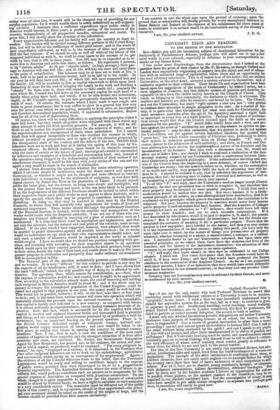U,N1VF.R.S1TY TESTS AND TEALNLATG.
TO TILE EDITOR OF Tag SPECTATOA. TO TILE EDITOR OF Tag SPECTATOA.
Slu-oBefere y.on ouitthe interastieg subject of, Aeaderoical Education for the hurlybarly of Parliamentary, debates, perhaps you will allow me to say a few more words in your columns, especially in reference to your correspondents re- : markson my- former letter. I was under some disadvantage, from the circumstance that I looked at the question feein,thelpointof view chosen bpLiatt Newmansanthough Oxford and Loudon were respectively originatiugan.timairy iato the.object and end of educe- , tion with.an unlimited range of speculation before them and an opportunity for , the most arbitrary eclecticism. This is, of (verse true of the latter; but our ancient Universities, on the-other hand, accepted a system external to themselves, and of . authority superior to their criticism. Their whole life and-organization have been Wised upon the supposition of the tenth-of. Christianity; by which I mean, not a mere -negation of sludeism, but that,delmite system.of prootica and doctrine in- separable in from the sisible.society known as the Church of Christ. They teach, as belonging to that community, the doctrines to which it witnesses: The teachers and learners are alike its members, and bound by its laws. The Church, and not the Universities, has-made " right-opinion a sine-qua non"; they profess ta.coraincettaeir oducationin simple .allegiance to,its rule. As a matter of his- tory, it is quite.clear. that Christ unity (or what men leok,for Christianity, for some seventeen .centuries. after. the age. of the Apostles) esteemed a right faith as important in every way as a right practice. Perhaps the student of ecclesias- tical annals would find that the Church insisted upon the faith as the surest guarantee for the practice. "F." would differ totally from such a view, and pro- testagainst.tha,enor of "attributing too great an importance to opinion on par- tichiar ,soltisots ": :only let-him: remember. that. -his. protest is. wade not against the Universities, nor yet against certain individual .thinkers, but against that "great fact," the whole visible community of Christian men, professing to derive their system in unbroken continuity from. its Divine loader. " F. may, of course, demur to the admission'of such authority; and show, ha French and Ger- man philosophers have shown, the uophilosephical nature of its doctrines and the iiioonsistency of its fornsul. But into such a discussion-.you, Sir, would not allow me to follow him; nor,should I wish to confound a vindication of the Aca- demical training adamed.by our Universities with a controversy between histo- rical Christianity and modern philosophy. If the authoritative teaching and sys- tem of the Church-from thesbeginningia a mare delusion, of course Oxford and Cambridge arowrong: but-the questionsbefore xis whether, on the assumption of its truth- and. reality, they:properly fail the task of edureting men who be- lieve in it. I should ho inclined to say, that by the,signatures of test- exactas, they fail; -by training men in-haintsof devotion and eoverence, as well as byinentrating a pare andprimitivecreed, they-.succeed. To all this ' F."-- will reply, Allot the Universities need no imager accept Church antherityr for that our generation has no wish to recognize' it,. and therefore that their-property ,may bediver.ted to more popular purposes. I think that such a confieeation would -be neither wise nor just. Not seises because it is a funda- mental principle of all reform, as coatradistinguished from destruction, that it be conducted on the principles which govern theconstruetion-of the-institution to be -reformed. Not just; because the,property in -question. would never have become public property ifsachalientition had been foreseen. Had the-founders of Colleges contemplated such, an alteration, as- " F." -indicates, they would have left their money to their kinsfolk, and not to such unstable corporations. If it had desoendect by inheritance, would it latjusttoaleprive A, B, and C, the present owners? Bat it would have descended by utheritasee, had not the donors con- templaterlthecertaisty of seeming it for a particular purpose. Prove that the purpose is (not uapopalar, but). hurtful to. the nation, and then you may restore it to the representatives of -its 'first -owners : failingthis,proof you have only the same right over it which- by .the .nature of things you possesssaver all property whatever, whether belonging to esquire, a ntannfactarer, a cottager, or a on- aire. I earnestly desire to.-see -our Universities -reformed, but -upon their own essential principles, as •we-collect them from from the statutes and lives of the founders, and the history, of. the- Matitations=thernaelves: the alienation of their revenues to an opposite purpose-seems to me -mere epoliation. o F." will reply, that inasasehould- on that view be -celebrated in our College chapels. I think-not You--must -first-prove that the, founders would have de- sired it, if they were living; and that they-would have. preferred the Roman obedience to the eommunion ofthe Anglican Church. • Abiar as I am acquainted with-their statutes, I knew of no indication, that thetsiveald,have acted differently from their brethren in- the oixseentlepentarysor thatthey bad, any peculiar Ullm- an/inane tendencies.


























 Previous page
Previous page